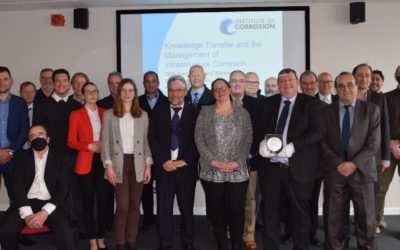The cart is empty!
Who will Benefit from PFP Training?
We’ve uncovered the need for improved standards in training, knowledge and expertise to prevent non-conformance of PFP application.
Simply put, well-designed, properly applied, and comprehensively inspected PFP protects people, assets and businesses. If the application process is not controlled and aligned with QA/QC standards for the coating used, you risk:
- The final system not meeting the design’s fire specification
- Flaws in the coating system leading to corrosion underneath the coating which is not externally visible and has consequent impact on fire performance
- Degradation of the coating over time due to severe environmental effects
Our latest courses
Passive Fire Protection (PFP) Epoxy Coating Inspector Level 2 – Classroom
The purpose of this NEW course is to train and examine Inspectors of epoxy intumescent Passive Fire Protection (PFP) on the inspection of common types of epoxy coatings used to protect against hydrocarbon fires on installations for both on and offshore facilities.
Passive Fire Protection (PFP) Epoxy Coating Inspector Level 2 – Online
The purpose of this NEW course is to train and examine Inspectors of epoxy intumescent Passive Fire Protection (PFP) on the inspection of common types of epoxy coatings used to protect against hydrocarbon fires on installations for both on and offshore facilities.
Passive Fire Protection (PFP) Epoxy Coating Inspector Level 3 – Classroom
The purpose of this NEW course is to train and examine senior Inspectors of epoxy intumescent Passive Fire Protection (PFP) on all aspects of the inspection of common types of epoxy coatings used to protect against hydrocarbon fires on installations for both on and offshore facilities.
Why is Passive Fire Protection so important?
Hear from Industry Experts on why Passive Fire Protection is so important to Industry and how this training can beneit your career.
Market dynamics are directing a new approach to PFP inspection
Market dynamics are directing a new approach to PFP inspection. This approach is industry-led rather than mandated by legislation.
As margins have reduced for manufacturers of PFP coatings, the free-of-charge on-site technical service personnel provided by manufacturers are no longer extensively offered. In addition, the oil and gas industry has sought to keep project costs down, with the effect that nobody in the contract chain wants to pay for PFP specialist qualified inspection services. The result is little or no inspection from individuals who can identify and prevent problems with PFP installation.
The knock-on effects of this reduction in expertise for the oil and gas and hydrocarbon processing industries, where PFP is critical, are expensive complications further down the line:
- The cost of substandard PFP can be experienced in the tragic loss of human lives
- The financial cost of rectifying problems is many, many times the cost of initial application
Consequently, there has been a strong desire from companies and individuals in the industry to develop best practices, navigate regulations, and improve standards that remove confusion and conflict. This has culminated in the development of new PFP training courses designed to accredit individuals who are involved in PFP installation and inspection.
Annual Membership runs from 1st July until 30th June annually
Who will benefit from PFP training?
Driven by industry needs and defined by industry experience, the new and unique Institute of Corrosion/PFPNet Fire Protection Coatings Inspector Training Programme will qualify inspectors of epoxy intumescent and cementitious PFP coatings used to protect against hydrocarbon fires. The course is designed to provide evidence of distinctive competence to properly understand and inspect PFP installation in new construction or retrofit situations.
In brief, there are three categories of operator who will benefit from this training:
- The owner operator/engineering house who will need to build the course into specification, to ensure that PFP is fully considered and that the design and application of PFP meets improving standards and industry best practices
- The fabricator/applicator who will need to have their inspectors competently trained, demonstrating that they are committed to maintaining improved standards of application and inspection
- The inspection houses who will need to have trained inspectors ready to meet the market requirement
Once you have joined as an Affiliate Member. Members with suitable qualifications and experience can become a Professional member, which entitles the use of TICorr, MICorr or FICorr as letters after your name.
Gain PFP expertise through blended learning
Blended (sometimes called ‘hybrid’) learning combines online training with traditional ‘classroom’ training to maximise effectiveness. The decision to present this PFP course in this manner was easy to make. It also means that COVID-19 risks are minimised, as you’ll be doing around 10 to 20 hours of study online.
The online part of the course will prepare you for the classroom learning. In the classroom, you’ll benefit from working in a group, gaining different perspectives, and improving the effectiveness of learning. The classroom sessions are delivered over four and a half days.
When you have completed the classroom sessions there will be a half-day exam, with peer review completed within 28 days.
Get In Touch
Call Us
Email Us
PFP News
Chris Lynch: Worthy Recipient of the Paul McIntyre Award 2022
Chris Lynch is the recipient of the 2022 Paul McIntyre Award. Why is this award special, and what makes Chris a more than fitting recipient?
Passive Fire Protection Courses: An Update from ICorr
ICorr’s PFP training has been upgraded. Discover how the latest passive fire protection courses are delivering training in the way that professionals want, and to meet industry needs.
PFP Training – A Global Event
PFP training will ensure that PFP inspection standards are improved. But what training is there, how is it delivered, and who should be trained?
Corrosion Engineering: A Working Day to Remember
It may be the premier corrosion engineering event around the globe. ICorr’s CED Working Day and Symposium. Here’s the 2022 story.
A Passive Fire Protection Course is Critical: The Experts’ View
Experts have their say and explain why a passive fire protection course is critical for asset integrity and safety of employees.
PFP – Critical for Health & Safety and Asset Integrity
Protecting structures using PFP, you protect the integrity of an asset therefore decrease risk to your people. That’s good health and safety.
The 63rd Corrosion Science Symposium at Electrochem 2022: All You Need to Know
The Corrosion Science Symposium 2022 will be held in a stunning location – perfect to stimulate discussion and networking.
PFP Course for Inspectors – Finally, Training That Meets Industry Needs
Finally, a comprehensive PFP course for inspectors that meets all the standards and the needs of the oil and gas industry.
Passive Fire Protection – The Financial Cost of Getting It Wrong
Passive fire protection is critical to protect high-risk facilities such as offshore oil and gas installations. Here we explore the financial cost of getting PFP wrong.











